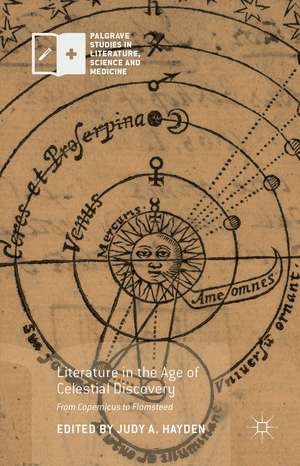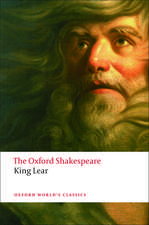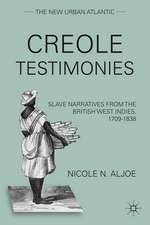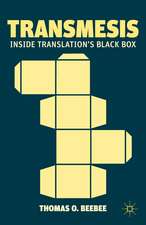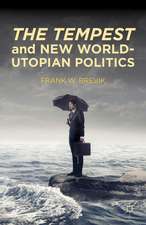Literature in the Age of Celestial Discovery: From Copernicus to Flamsteed: Palgrave Studies in Literature, Science and Medicine
Editat de Judy A. Haydenen Limba Engleză Hardback – 20 ian 2016
Din seria Palgrave Studies in Literature, Science and Medicine
- 20%
 Preț: 628.35 lei
Preț: 628.35 lei - 15%
 Preț: 699.12 lei
Preț: 699.12 lei - 15%
 Preț: 521.26 lei
Preț: 521.26 lei - 18%
 Preț: 780.68 lei
Preț: 780.68 lei - 15%
 Preț: 700.10 lei
Preț: 700.10 lei - 15%
 Preț: 642.68 lei
Preț: 642.68 lei - 15%
 Preț: 588.37 lei
Preț: 588.37 lei - 15%
 Preț: 643.84 lei
Preț: 643.84 lei - 15%
 Preț: 698.80 lei
Preț: 698.80 lei - 15%
 Preț: 523.54 lei
Preț: 523.54 lei - 15%
 Preț: 499.12 lei
Preț: 499.12 lei - 15%
 Preț: 583.93 lei
Preț: 583.93 lei -
 Preț: 417.14 lei
Preț: 417.14 lei - 15%
 Preț: 691.91 lei
Preț: 691.91 lei - 15%
 Preț: 586.55 lei
Preț: 586.55 lei -
 Preț: 219.74 lei
Preț: 219.74 lei -
 Preț: 388.52 lei
Preț: 388.52 lei -
 Preț: 221.28 lei
Preț: 221.28 lei - 18%
 Preț: 783.98 lei
Preț: 783.98 lei -
 Preț: 389.11 lei
Preț: 389.11 lei - 18%
 Preț: 783.50 lei
Preț: 783.50 lei - 15%
 Preț: 527.15 lei
Preț: 527.15 lei - 15%
 Preț: 586.23 lei
Preț: 586.23 lei -
 Preț: 454.74 lei
Preț: 454.74 lei - 15%
 Preț: 582.95 lei
Preț: 582.95 lei - 15%
 Preț: 527.48 lei
Preț: 527.48 lei -
 Preț: 385.84 lei
Preț: 385.84 lei -
 Preț: 383.71 lei
Preț: 383.71 lei -
 Preț: 382.57 lei
Preț: 382.57 lei - 15%
 Preț: 501.55 lei
Preț: 501.55 lei - 15%
 Preț: 642.03 lei
Preț: 642.03 lei - 18%
 Preț: 737.43 lei
Preț: 737.43 lei - 18%
 Preț: 894.03 lei
Preț: 894.03 lei -
 Preț: 450.11 lei
Preț: 450.11 lei -
 Preț: 391.79 lei
Preț: 391.79 lei - 15%
 Preț: 589.65 lei
Preț: 589.65 lei - 15%
 Preț: 499.59 lei
Preț: 499.59 lei
Preț: 640.55 lei
Preț vechi: 753.60 lei
-15% Nou
Puncte Express: 961
Preț estimativ în valută:
122.58€ • 133.11$ • 102.97£
122.58€ • 133.11$ • 102.97£
Carte tipărită la comandă
Livrare economică 22 aprilie-06 mai
Preluare comenzi: 021 569.72.76
Specificații
ISBN-13: 9781137583451
ISBN-10: 1137583452
Pagini: 224
Ilustrații: IX, 224 p.
Dimensiuni: 140 x 216 x 14 mm
Greutate: 0.42 kg
Ediția:1st ed. 2090
Editura: Palgrave Macmillan US
Colecția Palgrave Macmillan
Seria Palgrave Studies in Literature, Science and Medicine
Locul publicării:New York, United States
ISBN-10: 1137583452
Pagini: 224
Ilustrații: IX, 224 p.
Dimensiuni: 140 x 216 x 14 mm
Greutate: 0.42 kg
Ediția:1st ed. 2090
Editura: Palgrave Macmillan US
Colecția Palgrave Macmillan
Seria Palgrave Studies in Literature, Science and Medicine
Locul publicării:New York, United States
Cuprins
Introduction, 'Faln Systemes and Dead Chimæras'; Judy A. Hayden
1. Heliocentrism, Plurality of Worlds, and Ethics: Anton Francesco Doni and Giordano Bruno; Pietro Daniel Omodeo
2. Early Modern Space Travel and the English Man in the Moon; David Cressy
3. An English Renaissance Astronomy Club? Shakespeare, Observation,and the Cosmos; David H. Levy with Judy A. Hayden
4. To the Moon: Discovering the Comic in the Cosmic on the Early Modern English Stage; Gabrielle Sugar
5. Sailing to the Moon: Francis Bacon, Francis Godwin, and the First Science Fiction; Catherine Gimelli Martin
6. The Royal Society, Collective Vision, and Samuel Butler's 'The Elephant in the Moon'; J. Ereck Jarvis
7. 'Cinthia's Hero': Edward Howard's The Six days Adventure or the New Utopia; Judy A. Hayden
8. 'A new discovery of a new world': the Moon and America in Seventeenth and Eighteenth-Century European Literature; Brycchan Carey
9. Astronomy, Prophecy, and Imposture in Tyssot de Patot's Voyages et avantures de Jaques Massé; Daniel J. Worden
1. Heliocentrism, Plurality of Worlds, and Ethics: Anton Francesco Doni and Giordano Bruno; Pietro Daniel Omodeo
2. Early Modern Space Travel and the English Man in the Moon; David Cressy
3. An English Renaissance Astronomy Club? Shakespeare, Observation,and the Cosmos; David H. Levy with Judy A. Hayden
4. To the Moon: Discovering the Comic in the Cosmic on the Early Modern English Stage; Gabrielle Sugar
5. Sailing to the Moon: Francis Bacon, Francis Godwin, and the First Science Fiction; Catherine Gimelli Martin
6. The Royal Society, Collective Vision, and Samuel Butler's 'The Elephant in the Moon'; J. Ereck Jarvis
7. 'Cinthia's Hero': Edward Howard's The Six days Adventure or the New Utopia; Judy A. Hayden
8. 'A new discovery of a new world': the Moon and America in Seventeenth and Eighteenth-Century European Literature; Brycchan Carey
9. Astronomy, Prophecy, and Imposture in Tyssot de Patot's Voyages et avantures de Jaques Massé; Daniel J. Worden
Recenzii
"The essays assembled here powerfully reveal both the surprisingly enduring nature of early modern resistance to the Copernican revolution in astronomy and cosmology and the rich variety of the literary consequences of the emergence of the New Science. By drawing critical attention to a great range of topics and texts across the long-seventeenth century, this collection brings new concerns and vital insights to the current critical conversation regarding the complex and intriguing relationship between early modern science and literature." - Howard Marchitello, Professor of English, Rutgers University, USA
"The early modern period witnessed an extraordinary convergence of astronomy and literature. Copernicus and Galileo prompted new questions: Did the earth move? Were there more worlds than one? Might other planets be inhabited? Literary writers answered these questions, and this bracing and original collection of essays illuminates the literary response to astronomical revolution, from Europe to America, across languages and times, and will be welcomed by all students of the period." - William Poole, John Galsworthy Fellow and Tutor in English, Oxford University, UK
"The early modern period witnessed an extraordinary convergence of astronomy and literature. Copernicus and Galileo prompted new questions: Did the earth move? Were there more worlds than one? Might other planets be inhabited? Literary writers answered these questions, and this bracing and original collection of essays illuminates the literary response to astronomical revolution, from Europe to America, across languages and times, and will be welcomed by all students of the period." - William Poole, John Galsworthy Fellow and Tutor in English, Oxford University, UK
Notă biografică
Judy Hayden is Professor of English at The University of Tampa, USA.
Textul de pe ultima copertă
The reconfiguration and relinquishing of one's conviction in a world system long held to be finite required for many in the sixteenth and seventeenth centuries a compromise in one's beliefs and the biblical authority on which he or she had relied - and this did not come without serious and complex challenges. Advances in astronomy, such as the theories of Copernicus, the development of the telescope, and Galileo's discoveries and descriptions of the moon sparked intense debate in Early Modern literary discourse. The essays in this collection demonstrate that this discourse not only stimulated international discussion about lunar voyages and otherworldly habitation, but it also developed a political context in which these new discoveries and theories could correspond metaphorically to New World exploration and colonization, to socio-political unrest, and even to kingship and regicide.
